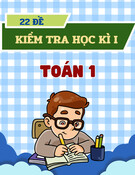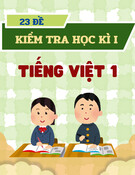
ĐỀ KIỂM TRA CHẤT LƯỢNG HKI – ĐỀ SỐ 1
Preliminary activities.
Jack London ( 1876 – 1916 )
Jack London’s life and writings are thought by many to represent the American love of adventure. He was
born in Sanfrancisco, California, and quit school at fourteen to become a sailor. He travelled a great deal during
his short lifetime, in the United States, Europe, and the Far East. When gold was discovered in Alaska in 1897,
Jack London, answering the call of adventure, took part in the famous “ gold rush”. His experiences in the wild
northern country provided him with material for many of his later stories and novels, including To Build a Fire.
Among his best – known novels are The Call of the Wild and The Sea – Wolf.
Reading.
He stood up. He was a little frightened. He stamped up and down until the stinging returned into the feet. It
certainly was cold, he thought. That man from Sulphur Creek had spoken the truth when telling how cold it
sometimes got in the country. And he had laughed (1) ____ him at the time. That showed that one must not be too
sure (2) ______ things. There was no mistake about it, it was cold. He walked up and down, stamping his feet and
thrashing his arms, until he was reassured (3) ____ the returning warmth. Then he got out matches and proceeded
to make a fire. From the undergrowth, (4) _______ high water of the previous spring had lodged a supply of old
twigs, he got his fire – wood . Working carefully from a small beginning, he soon had a roaring fire, over which
he thawed the ice from his clothes and in the protection of which he ate his biscuits. For the moment the cold (5)
________ outwitted. The dog took satisfaction in the fire, stretching out close enough for warmth and far enough
away to escape being singed.
When the man had finished, he filled his pipe and took his comfortable time over a smoke. Then he pulled on
his mittens, settled the earflaps of his cap firmly about his ears (6) ______ took the creek trail up the left fork. The
dog was disappointed and wanted to go back toward the fire. This man did not know cold. But the dog knew : all
its ancestry knew, and (7) _____ had inherited the knowledge. And it knew that it was not good to walk outside in
such tearful cold. (8) ____ the other hand, there was no keen intimacy between the dog and the man. One was the
slave of the other, and the only the only caresses it had ever received were the caresses of the whip – lash . So the
dog (9) ______ no effort to communicate its apprehention to the man. It was not concerned with the welfare of
the man : it was for his own sake that it wanted to go back toward the fire. But the man whistled, and spoke (10)
____ it with the sound of whip – lashes , and the dog swung in at the man’s heels and followed after.
New word.
Stamp Caress Thrash Twig Apprehension
Thaw Ancestry Outwit Singe Reassure
Mittens Fork Earflaps Intimacy Whip – lash
Comprehension.
A – Choosing the correct information.
1. He stamped his feet and thrashed his arms ______________
2. Near the roaring fire _________________
3. After taking his comfortable time over a smoke, the man ____________
4. Dogs inherit ___________ from their ancestry.
5. The dog followed the man ______________
B – Answer the following questions.
1. In what condition was the man in the first part of the first paragraph ? _________________________
2. How did he feel in the second part of the first paragraph ? _________________________
3. Did he enjoy his comfortable time over the smoke ? Why ? _________________________
4. Why did the dog make no effort to go back toward the fire ? _________________________
5. Why was there no keen personal relationship between the man and the dog ? ___________________
C – Two – word verbs with GO.
Complete the following sentences with particles.
Go after Go ahead Go along Go away Go on Go over
Go back Go by Go down Go off Go out Go up
a. There was a power failure and all the lights went __________.
b. The building of the new bridge will go _____ as planned.

c. I always go _______ all my lessons before the test.
d. If you’re hungry, go ______ and eat your meal.
e. – Take care of everything while I’m not in the office.
- Are you going ____________ ?
- Yes, I will go to the beach for a few days.
f. We all woke up in the middle of the night when the alarm – clock suddenly went ___________ .
g. – Why is Mr Smith so depressed?
- His business has gone _________ recently .
h. - How is your brother’s studying going __________ ?
- Fine. He has made steady progress in the last few months
i. Time goes ________ quickly when we’re busy, doesn’t it ?
j. Why don’t you go ________ working. The examination has drawn near.
k. Please go _______ this report before we send it to the manager’s office.
D – Prefixes : UNDER – AND OVER.
1 – Under : indicates place or situation below or beneath.
Undergrowth Underachievement Underage
Underclothes Undercover Undercurrent
Underpass Underweght Undercharge
Underdevelop Underdo Underestimate
Underfeed Underlay Undermine
Undersell Undersign Understate
Understudy Underwrite Undergraduate
2 – Over : occurs in various senses in compounds with the sense of “ over the limit” , “ to excess” , “ too much”.
Overcoat Overconcern Overdose
Overexpenditure Overoptimism Overproduction
Overtime Overweight Overanxious
Overbearing Overconfident Overelaborate
Overjoyed Overnight Overseas
Oversized Overzealous Overact
1. Somalia is one of the __________ countries in the world.
2. You are only slightly __________ for your height.
3. I _______ the time we needed by 30 %.
4. They are Cambridge ______________.
5. The villagers are clearing a path through the ____________.
6. Our goods can’t be ______________.
7. We, the ________, declare that we agree with the Chairman’s proposal.
8. He ___________ on sleeping – pills and died.
9. If your luggage is ___________, you’ll have to pay extra.
10. Even if you are good at a game, you shouldn’t be ___________.
11. Amateur actors often _______________.
12. This is an ___________ broadcast.
13. You shouldn’t be ____________ before the exam
14. Mr. John is very generous about _____________ payment.
E – Hoµn tÊt c©u víi mét mÖnh ®Ò lµm tr¹ng ng÷ chØ thêi gian.
1. He set off for another journey as soon as he ______________.
2. It began to rain just as he _________________.
3. She had written three novels before she __________________.
4. I’ll have taken three courses by the time you ______________.
5. The dog has followed its master ever since ________________.
6. The train had just left when I ______________.
7. What were you doing when your father _____________.
8. She was listening to the radio when _________________.
9. What will you do as soon as you _____________ ?

10. Don’t bother me while I_____________.
11. You have to listen to your teacher while ___________.
12. You should do a good deed whenever you ____________.

ĐỀ KIỂM TRA CHẤT LƯỢNG HKI – ĐỀ SỐ 2
Exercise. Match the following headings to the paragraph.
a. Treating cancer
b. Ear surgery
c. Cosmetic surgery
d. The laser as a powerful surgical treament.
e. The laser in British hospitals.
A. While military scientists test lasers against satellites, surgeons use them as miraculously accurate scalpels.
The beam can be focused to spot one fiftieth the size of a human hair: yet its intensity is enough to kill cancer
cells or drill though the most delicate bones.
B. For cancer treatment, the disease cells must be killed while their healthy neighbours are left unharmed.
Where the cancer can be directly and accurately attacked, laser treatment does well. For cancers that are less
accessible, there is a new and potentially valuable technique in which the patient is injected with a chemical
that then attaches itself preferentially to cancer cells. When the laser strikes the chemical, it releases a form of
oxygen that kills these cells.
C. Furthermore, the laser beam can also remove bone and so it is invaluable in ear surgery. The sounds we
hear are carried from the eardrum to the nerves of the ear by a delicate set of small bones which sometimes
solidify causing deafness. A laser vaporises the bone without touching any of the surrounding tissue.
D. Birthmarks, once almost untreatable, are a mass of blood vessels and being red, they absorb the laser beam
strongly. It seals them so that the mark becomes less conspicuous. The normal cells on the skin’s surface,
which don’t absorb much of laser beam, act in the healing and help to conceal the mark. The operation can
transform the lives of people who had to suffer from lifetime physical abnormalities.
E. Some ten new centres already using this treatment will soon be opened in Britain, which is already one of
the leaders in the laser treatment of bleeding peptic ulcers and this, combined with medicines, can mean ulcer
treatment without conventional surgery.
New words
Intensity. Preferentially Solidify Tissue Peptic ulcer
Beam Eardrum Blood vessels Nerve Birthmark
Delicate Scalpel Conspicuous Surgery Conspicuous
Comprehension.
1. Complete the sentences with the correct form of words given.
A. Absorb.
- This is a kind of _________ cotton wool.
- His work suffered because of his total _________ in sport.
- Plants ______________ oxygen.
- This kind of silk is not ____________.
B. Deaf
- He’s ________.
- The head injury _________ her for life.
- The ________ noise outside makes us feel headache.
- _________ is a kind of disabilities.
C. Military
- He is a person who supports ___________.
- The ________ were called in to deal with the riots.
- You’re not allowed to cross the ________ zone.
- It is a _________ government.
- The government wants to ________ this training centre.
D. Potential
- VietNam is a ________ rich country. This is a country with great _______.
- This new kind of generator can generate a current of high _________.
- When they made the plan, they thought about the _______ resources underground.
E. Prefer
- I should choose this in ________ to any other.
- Which would you ________, tea or coffee /
- He has a _______ for English novels.

- These countries are __________ in imports of raw cotton.
2. Combine the following sentences with SO THAT or IN ORDER THAT.
a. I’ll give you my telephone number. I want you to be able to phone me.
b. We wore warm clothes. We didn’t want to get cold.
c. I spoke very slowly. I wanted the man to understand what I said.
d. I wispered. I didn’t want anyone to hear our conversation.
e. Please arrive early. We want to be able to start the meeting on time.
f. She locked the door. She didn’t want to be disturbed.
g. He wore glassess and a false beard. He didn’t want anybody to recognize him.
h. He studies very hard. He doesn’t want to fail the final examination.
i. She practises English everyday. She wants to speak to foreigners.
j. She bough a new car. She wanted to make a trip to Canada.
k. I got up early. I didn’t want to be late for school.
h. We lower the volume of the radio. We don’t want to bother our neighbour.
3. Pronounce these fractions.
1 1 4 2 3 1 1 1
5 6 5 3 4 2 4 2
4. Match these acronyms with their sources.
a. UNESCO. 1. Cooperative for American relief everywhere.
b. RADAR 2. United nations children’s fund.
c. CARE 3. United nations educational, scientific and cultural organization.
d. AIDS 4. United nations organization.
e. UNICEF 5. Acquired immune deficiency syndrome.
f. BASIC 6. World health organization.
g. GATT 7. Radio detecting and ranging.
h. NATO 8. Women’s army Corps.
i. SALT 9. General agreement on Tariffs and Trade.
j. UFO 10. Strategic Arms limitation Talks.
k. UNO 11. Unidentified flying object.
l. VAT 12. North Atlantic Treatty Organization.
m. WHO 13. Value added tax.
n. WAC 14. Beginners’ all purpose sympolic instruction code.
5. Choose and fill in the missing words in the sentences below.
Antiseptic Hay fever Mumps Scald
Infectious Matron Midwife Sedative
Crutches Measles Prescription Surgeon
a. The piece of paper you get from the doctor to take to the chemist’s to obtain medicine is called a ___.
b. Be careful with that boiling water; you might __________ yourself!
c. ______ is an illness, something like a bad cold, which makes the person sneeze a lot, caused by
breathing in pollen dust from plants.
d. His neck and mouth are swollen. I think he’s got ________.
e. You’d better put some ________ on that cut, just to be safe.
f. It must be ________. She’s got a fever, and look at all those small red spots on her face and body.
g. When she broke her leg. She had to go around on ________ for several weeks afterwards.
h. The woman in charge of a hospital is called the _____. She has control over all the nurses .
6. Fill in the blank with suitable word.
pain and used researchers
bleeding replace surgery laser
The development of many different types of lasers during the last 40 years has offered (1) ______ many wavelengths
of laser light.
The most common laser in (2) ______ has been the CO2 laser. It is this laser that is _______ commonly for surgery of
the gum tissues. Many of the reports suggest that this _______ is beneficial because it allows for surgery without much
(5) _____. Many patients also report that when the CO2 laser is used for surgery, they do not have (6) _______
following surgery.
Patients (7) ______ dentists alike wish to find a laser that can (8) ______ the dental drill.
Exercise 7. §iÒn giãi rõ ®óng
1. He was kept _________ in his research ________ lack of money.
2. I couldn’t take __________ the lecture at all. It was too difficult _________ me.

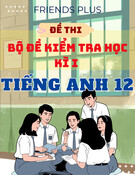
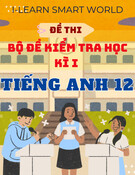


![Tổng hợp 20 Đề kiểm tra chất lượng HK1 Tiếng Anh 12 [có đáp án]](https://cdn.tailieu.vn/images/document/thumbnail/2011/20111010/portsmouth2518/135x160/de_kiem_tra_chat_luong_hki_mon_5443.jpg)
![10 Đề kiểm tra chất lượng HK1 Tiếng Anh 12 [Năm học mới nhất]](https://cdn.tailieu.vn/images/document/thumbnail/2011/20111010/portsmouth2518/135x160/de_kiem_tra_chat_luong_hki_m20_0497.jpg)
![Đề kiểm tra Tiếng Anh 1 tiết trắc nghiệm: [Mới nhất]](https://cdn.tailieu.vn/images/document/thumbnail/2011/20111008/chelsea2518/135x160/cac_dang_bai_tap_trac_nghiem_tieng_anh_lop_12_912.jpg)
![Đề kiểm tra học kỳ 1 môn Anh Văn lớp 12: Đề nghị [Năm học]](https://cdn.tailieu.vn/images/document/thumbnail/2011/20110918/liverpool2518/135x160/tieng_anh_12_2523.jpg)
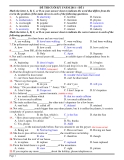
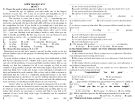





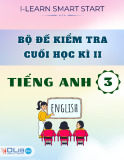





![Đề thi Tiếng Anh có đáp án [kèm lời giải chi tiết]](https://cdn.tailieu.vn/images/document/thumbnail/2025/20250810/duykpmg/135x160/64731754886819.jpg)
